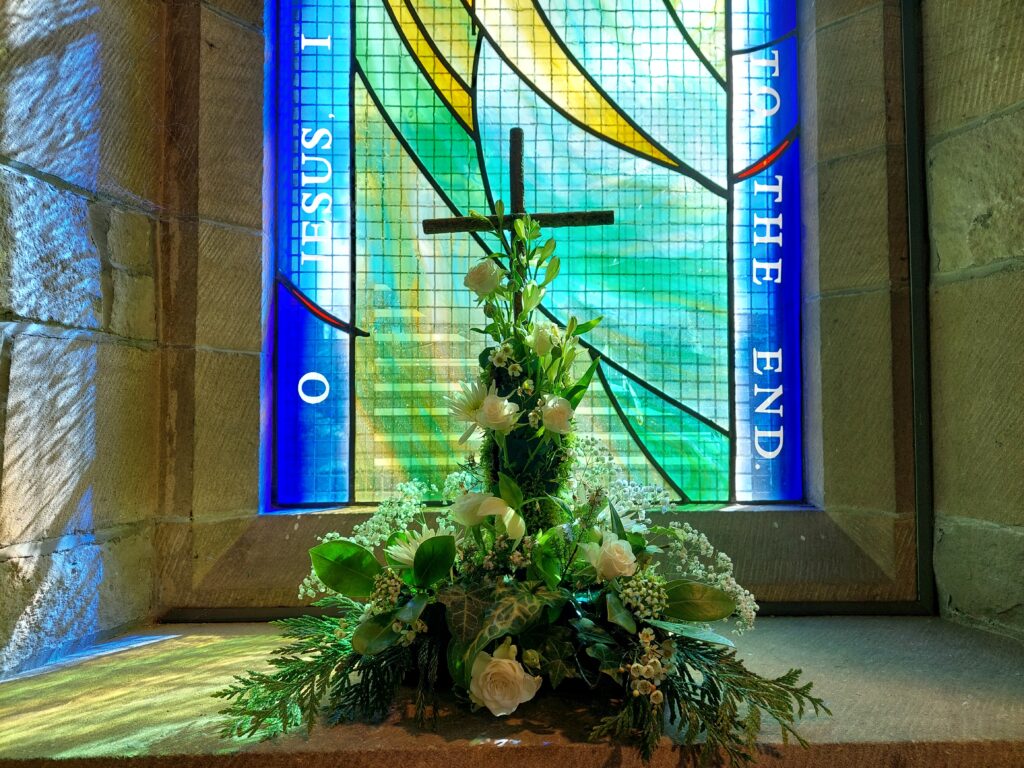
+ Alleluia, Christ is risen..
And the young man in the tomb said, ‘he is not here, he has been raised’.
Who invented the book? Christians. Codex. for the Bible.
Are we the people of the book? No, we worship a person, Jesus, not a book. The Bible is the word of God in human words. Jesus is the divine word of God made flesh.
But the Bible is important. Every three years, Sunday by Sunday, we work our way through the three gospels. John is special, he is read in Eastertide and his version of the passion story is read on Good Friday. This year is the year of St Mark. Last Sunday we heard Mark’s version of the passion story. Today we have his version of the Easter story, and it is different.
It ends abruptly with ‘for they were afraid’. It is even weirder in Greek for it ends with the word ‘for’ – literally ‘they were afraid for…’ We have just heard it. The women go to the tomb of Jesus to anoint his body. The tomb is empty but for a young man in white. He tells them to go and tell Peter and the disciples that Jesus has been raised. And they don’t; they run away for they are afraid. This is so weird that the early Christians added extra verses to make it like the other gospels where the women do tell Peter and the disciples. But these are not in the earliest manuscripts. It is so weird that modern scholars tried to explain it by saying a dog ate the last page of Mark’s manuscript or suchlike. But in a book about the salvation of the world you’d expect someone to remember a few lost verses.
What we heard is the original ending. What is Mark up to? I think it is something very special which says something important about the resurrection of Jesus, the Church and about our faith in general.
In many ways Christianity has been dominated by men, but this is subverted at the heart of the gospel. Mary is the chosen one of Israel, not Joseph. As we saw here on Good Friday, Mary and Jesus’ female friends stay by his cross as he dies while the blokes, his mates, all run away or betray him. Then, on Easter morning, the men are broken by grief while the women do something practical. You know the old story: if the three wise men were women they’d not have brough gold, frankincense and myrrh but a casserole, fresh nappies and a bottle of gin. But here it is spices, the women go to the tomb to care for his body. In Mark it is the same three women who stood by his cross.
Christianity is a religion centred on a woman giving birth; and its most important event, Jesus rising from the dead, is first told to the faithful women. For centuries women couldn’t preach, but the first proclamation of the gospel is by the faithful women who went to the tomb. Thus, Matthew, Luke and John. But Mark subverts even this. Like the men, the women are now afraid, they run away and don’t share the gospel. I bet they were afraid.
The women ‘went out and fled from the tomb, for terror and amazement had seized them; and they said nothing to anyone, for they were afraid’. It’s a stark ending. Why did Mark end here?
The clue is in a verb. Did you enjoy learning verb tables at school? Amo, amas, amat, or the French equivalent. The women enter the tomb and see a young man clothed in white. He is an angel and he says ‘Do not be afraid; you are looking for Jesus of Nazareth, who was crucified. He has been raised; he is not here’. Not he is risen but he has been raised, a passive verb. It’s called the ‘divine passive’ and is used when God acts. God raised Jesus. The resurrection is about God’s act, not ours, and that is good news. The men are useless and ran away. In Mark even the women run away. All of us fail.
But back to where we started, with the Book. We are not the people of a book. We are part of a community, the Church the Body of Christ. Why did Mark write his gospel? Those who remembered Jesus were dying and there were so many new Christians they wanted the stories written down. The Gospels were not written to be read at home, there weren’t enough books. They were written to be read in Church. And why was there a Church? Because the women eventually did tell Peter and the Apostles. Mark knew that. He didn’t say they didn’t. He just ended at one stage in the story, because the story keeps going on. By the message of the women Peter and the Apostles came to faith, they met the risen Jesus themselves and founded the Church for which Mark wrote and which is gathered here today. The Bible only makes sense in the Church.
Our faith is built on God’s act in raising Jesus from the dead. We fail. We are afraid. Men and women. Old and young. Rich and poor. We all suffer, feel afraid and die. But Easter tells us not to be afraid – it doesn’t depend on us; we depend on God. Even if we eventually do the right thing, like the holy women. In these last few days we have been through the terrible grief and pain of the cross, Jesus descent into the hell of godforsakenness, alongside those in despair. But now, still carrying our pain, we can say ‘he has been raised’, ‘he is risen’, and we are risen with him. We, gathered here, are part of this story and hope can be born in our hearts.
Alleluia, Christ is risen. He is risen indeed, alleluia!

